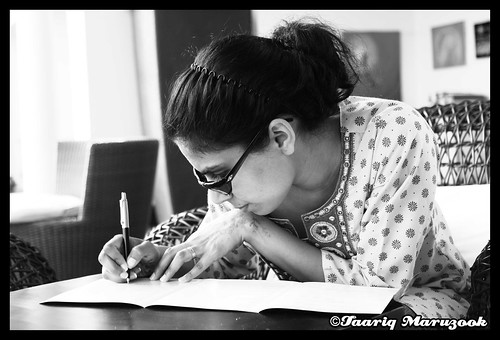
If you want your writing to improve, it’s always a good idea to set a piece aside for a while and come back to it later.
But sometime, not even a month’s Time Out in the dusty recesses of your hard-drive is enough to separate your story from your hopes for it, and the only way to get some perspective is to show it to someone else.
The real benefit is not just in plucking up the courage to show your writing to another soul (though that’s powerful). It’s in knowing how to listen to and act upon their feedback.
How Not To Take Feedback
Recently, at my Real-World Writers’ Group’s critique session, I listened as a high-energy, opinionated novelist read out a sample of her novel, which was similarly high-energy and opinionated. It was also funny and well-crafted and she was clearly at the stage where she needed feedback only on errors, omissions and clarity. So we waded in: “You said she was standing on the other side of the minivan so how did he see her?”, “Oh, I do that hobby and there’s a detail you missed.”
It was good stuff and just what she needed. But every time someone offered a critique or asked a question, the writer cut them off with a defense of why she had written it that way and prefaced most of her comebacks with, “Well, what you don’t understand is…”.
I started to wonder a, why she had come to the group, and b, how she ever hoped to get this promising manuscript published if she was unwilling to take feedback. (I had a sudden vision of her trying to follow all her readers home from the bookstore, calling out “Now, don’t forget, when I say that Marianne is biting her lip, that means she’s happy, not that she’s nervous. And the dog is symbolic. Symbolic!!”)
If It’s Not On The Page, It’s Not In The Story
If readers ask you for clarity about a story detail, a character or an event, it means something is missing. Listen to them, make notes and then go away and figure out a way to include more information or clues right there on the page.
If your story has too little (or just as likely: too much) of something, remember that this is not the end of the world. It doesn’t mean you stink as a writer. It doesn’t mean you’ll never be any good. It just means you have some more (re)writing to do. And that now you know what you have to do.
Rejecting Feedback
Just as important as listening to and acting on feedback, is the ability to decide you’re not going to act on it.
I like to write stories with twists at the end. I like science fiction. I like humor. So I took along a funny (I hoped), twisty, vaguely-sci-fi story to my writers’ group’s critique night recently. I was pleased to get a few laughs and some smiles, but I also noticed that one of the women in the group was smiling extremely politely and blinking a lot. I gave her an encouraging look and took a deep breath. When she prefaced her remarks with,
“I’ve never read any science fiction and I really prefer slice-of-life stories…” I knew what was coming next. She didn’t get it and had no clue what had happened at the end of my story.
Of course I was disappointed. And of course I wondered if I should make the twist in the tail more obvious. But I also happened to have another person in the group who knew exactly the kind of story this was supposed to be and who enjoyed those kinds of stories. That feedback was, naturally, very different.
I was interested in the feedback of the more ‘general fiction’ reader, but I gave more weight to the critique of the group’s lone sci-fi fan with the great sense of humor who thinks the ending was skating on just the right side of ‘predictable’.
Listen. Take notes. Consider the source. Go with your gut.
How To Find Critique Partners
If you’ve read this far and are thinking “well, that’s all very well, but how do I find these thoughtful, insightful critique partners?” here are a few idea.
Connect With Other Writers
Readers are wonderful people (I’m one of them), but if you pass a story to the most avid reader who doesn’t write, you’ll likely end up with a fairly unhelpful critique: I liked it/Hmm, it didn’t really work for me.
Avid readers know when something works, but they don’t tend to spend a lot of time thinking about the technique behind good writing: character arcs, if/then cycles, opposing characteristics. And why should they?
Finding Writers To Connect With
Writer Unboxed – This blog has spawned a friendly and passionate writers’ group at their Facebook site. Most of the writers are novelists but many write short stories too. Join the conversation, make some writer friends and see where it takes you.
Meetup.com – I found a fabulous writers’ group in my area through Meetup. Check the listings and see what other people say about the group. In my experience a great facilitator makes all the difference, so see if you can send a private message to some members to see what they think of the group’s leadership and make-up. Also, try to find a group where at least some writers are fans of the genres you write in.
Backspace – A serious writing organization for serious writers. There’s a subscription fee to join the group, which tends to weed out the dilettantes. I’m not a member but several people I respect have raved to me about the forums.
StoryADay.org — leave a comment here on this article saying what you write and that you’d like to form a critique group. If there’s enough interest I’ll set something up in our very own forums and get things rolling.
 This post is part of the Becoming A Better Writer series. Find the other parts here or buy the ebook and help support StoryADay May:
This post is part of the Becoming A Better Writer series. Find the other parts here or buy the ebook and help support StoryADay May: 
Becoming A Better Writer Pt. I: One Skill You Must Master To Become A Great Writer
Becoming A Better Writer Pt. II: How To Ask For — And Deal With — Feedback
Becoming A Better Writer Pt. III: Learn From Your Writing Heroes
Becoming A Better Writer Pt. IV: Practice Makes Perfect (Or: Write More!)
Becoming A Better Writer Pt. V: Adjust Your Expectations
If you want to read more like this, let me send future articles straight to your inbox:
This post is part of the Becoming A Better Writer series. Find the other parts here or buy the ebook and help support StoryADay May:





